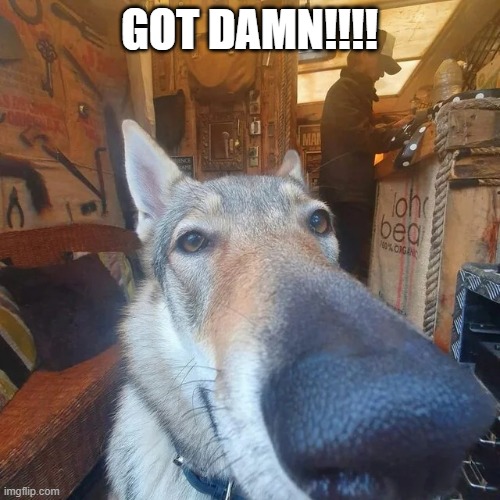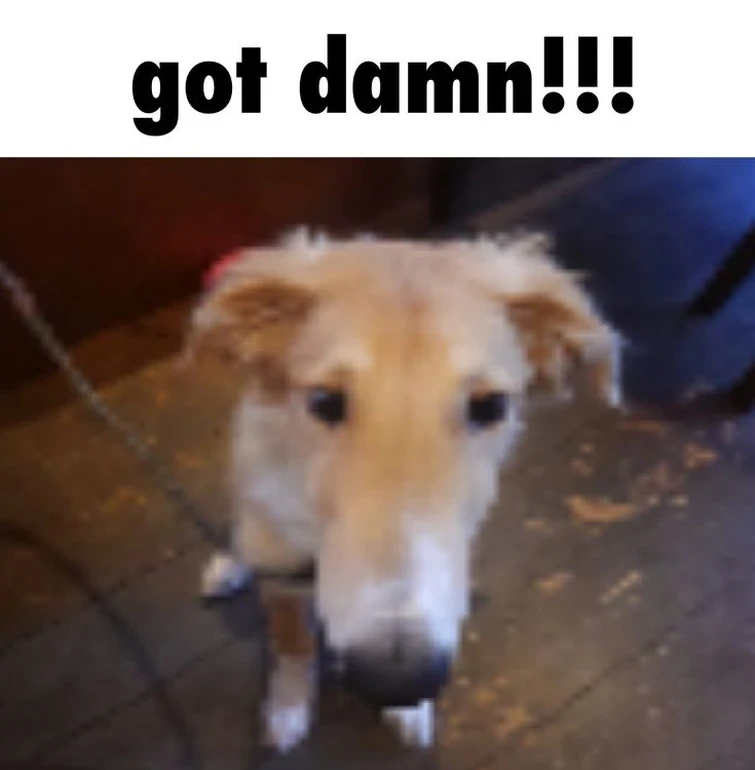Ever wondered how a simple phrase, often punctuated with an expletive, could capture the essence of determination, humor, and the enduring bond between humans and their canine companions? The phrase "got damn dog," in all its varied forms, has transcended mere slang, becoming a cultural touchstone that reflects our contemporary world, from the digital playground of TikTok to the gritty arenas of professional sports.
The internet, that vast and often unpredictable ocean of information, has a strange but undeniable affinity for two things: dogs and memes. The convergence of these elements, especially when seasoned with a touch of irreverence, creates a potent cocktail of virality. The phrase "got damn dog," a seemingly simple combination of words, has managed to tap into this cultural zeitgeist, appearing in countless videos, images, and discussions across various online platforms. It's a phrase that can be playful, a descriptor of grit, or even a commentary on the absurdities of modern life. It can be found in short-form video clips on platforms like TikTok, where users creatively interpret the concept, often adding their own unique spin on the phrase. The humor is in the unexpected, the juxtaposition of the mundane with the outrageous, and the shared understanding of the "got damn dog" mentality.
Beyond the realm of internet trends, the phrase has permeated other aspects of popular culture. In the world of professional sports, particularly basketball and other competitive arenas, "got that dawg in him" serves as a catchphrase to describe athletes who exhibit exceptional mental toughness and the ability to perform under pressure. Its a testament to their resilience, their unwavering spirit, and their willingness to do whatever it takes to succeed. The "dawg" in this context isn't necessarily a literal dog, but rather a metaphor for tenacity, grit, and an unyielding competitive drive. The phrase underscores the importance of mental fortitude in high-stakes situations, emphasizing the human spirit's capacity to overcome obstacles. Its a phrase that celebrates the intangible qualities that separate good athletes from the truly great ones.
| Aspect | Details |
|---|---|
| Origin | Emerged within online communities, particularly on platforms like TikTok and Twitter. |
| Usage | Used in videos, memes, and general online discussions. |
| Connotation | Often associated with humor, resilience, and the unyielding spirit of both humans and dogs. |
| Popularity | Gained significant traction, particularly through its use in sports and memes. |
| Cultural Impact | Reflects the growing importance of internet slang and the ability of specific phrases to capture broader cultural ideas. |
The history of the phrase "got damn dog" is, perhaps unsurprisingly, interwoven with the history of dogs themselves. Archaeological evidence suggests that dogs were domesticated over 15,000 years ago, making them one of the first animals to be domesticated by humans. This long history of companionship has fostered a deep emotional connection, reflected in our language, art, and culture. The very existence of the phrase is evidence of this enduring relationship. The "got damn" element adds a layer of emphasis, highlighting the impact and significance of the associated concept.
The phrases evolution isn't restricted to its literal interpretation. It can be seen as a commentary on societal expectations and human behavior. For instance, the phrase can be applied to a person exhibiting resilience or determination in the face of adversity, reflecting the dog's perceived ability to persevere. The use of "got damn dog" as a meme demonstrates how linguistic phrases can be adapted and utilized to convey meanings. This adaptability suggests that the usage of the phrase is tied to the way people process information, experience, and share cultural perspectives.
The humor inherent in "got damn dog" often stems from unexpected juxtapositions. A dog's close-up nose, coupled with the words "got damn!", is a simple yet effective meme format. It encapsulates the inherent comedic potential in combining unexpected images with relatable phrases. This humor is amplified when paired with the various interpretations of the phrase.
The power of the phrase also extends to its versatility. Consider the use of the phrase "i act like a damn dog," where someone might be implying behavior related to loyalty or even silly, uninhibited antics that mirror the unpredictable behavior patterns of dogs. Furthermore, the adaptation of "got that dog in him" by the sports community showcases the phrases adaptability. It embodies not just the behavior of a dog, but rather an intangible qualitymental toughness. The use of such phrases within a community enhances the bonding and creates a shared language that is easily understood.
One interesting aspect of the phrase's popularity is its phonetic nuances. As with any language, there are variations in pronunciation. An example to consider is the difference between got damn hot dog and got dang. These phonetic distinctions highlight how language evolves, reflecting cultural influences and regional accents. This adaptability and flexibility are integral to the phrase's appeal, allowing it to be modified and reinterpreted as time passes. These variances showcase how the phrase is used, reflecting both humor and the regional variations that can be incorporated into language.
The phrase's impact is not limited to just humor and online interactions. It has also found its way into the work of artists, musicians, and other creatives. The song "Damn Dog" by the Manic Street Preachers is an example of how the phrase has resonated beyond the internet, inspiring artistic expression. This demonstrates the phrases capacity to inform creative outputs, and how it shapes broader cultural discourse.
The "got damn dog" phenomenon highlights the powerful role of memes in our contemporary society. Memes act as a kind of shared shorthand, communicating complex ideas, emotions, and cultural commentary with speed and efficiency. The popularity of "got damn dog" demonstrates how a phrase can become a rallying cry for shared experiences and perspectives. It encourages a sense of communal identity, a collective acknowledgment of both the humor and the serious aspects of human existence.
The spread of the phrase is also a reflection of how information is shared today. Social media platforms and online communities facilitate rapid dissemination of content, allowing memes to go viral and to be adapted and reinterpreted by millions of people. The phrase's adaptability allows it to fit into many circumstances, from the lighthearted to the more profound. This adaptability ensures its continued relevance in a constantly evolving online landscape. The adaptability reflects the continuous change in language, humor, and the way we communicate with one another.
The phrase "got damn dog" has become more than just a string of words. It is an important symbol in a constantly evolving digital world, reflecting the complex connections between people, their pets, and their experiences. It encourages a sense of community, as it is easily adapted and understood, thus it will continue to be a part of our lives. The phrase serves as a reminder of the value of resilience, determination, and the enduring companionship of dogs in human lives. It is a phrase that has been adopted, adapted, and will continue to endure.


